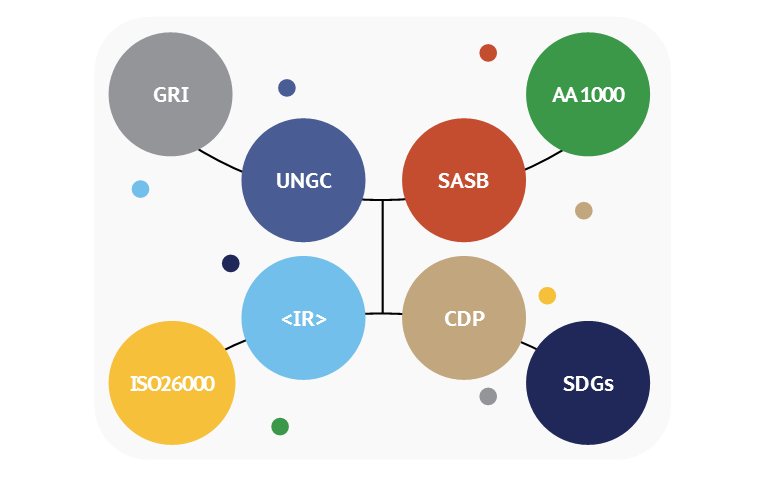Due to ever growing economies, connectivity technologies and fast depletion of our planet’s limited resources, the idea of Sustainable Development has become the most relevant principle in today’s times. The undeniable need for sustainable development has generated the establishment of an array of sustainability frameworks that are designed to be the guidance for all organizations to move the world towards more sustainable future.
While the current group of sustainability frameworks continues to expand, the most well-known are:
- Global Reporting Initiative (GRI)
- Sustainbaility Accounting Standards Board (SASB)
- Carbon Disclosure Project (CDP)
- ISO26000
- The International Integrated Reporting Council (IIRC)
- United Nations Global Compact (UNGC)
- Accountability AA 1000 Series of Standards
- Sustainable Development Goals (SDGs)
Although each of these frameworks has its own specific purpose, they share the same mission to support and encourage organizations to manage their wider impacts. Applying these frameworks can help private, public and 3rd sector organisations communicate more effectively with their stakeholders and be transparent about the way they add value to society, environment and economy.
The common goal of all these frameworks proves that they are collaborating and not competing. The cooperation between GRI and SASB that was launched at the Ceres Conference in San Francisco in 2017 made a point that these two frameworks are designed for different, but complementary, purposes. Namely, GRI is focused on the company’s impacts on the world and the SASB on the world’s impacts on the company. Moreover, GRI and IIRC have announced a collaboration that will help organizations to use both frameworks in order to provide insights into value creation and drive transparency. Also, the Corporate Reporting Dialogue is the IIRC initiative to bring all these frameworks under the same umbrella as a response to market demands for coherence and comparability between these frameworks.
Yet, the establishment of the UN Sustainable Development Goals (SDGs) has transformed the universe of relevant sustainability developments by providing globally accepted guidance for all sustainability frameworks and a common goal. Especially, GRI is cooperating with the UN Global Compact through Reporting on the SDGs to advise organizations on expected disclosures on the SDGs.
Sustainability Knowledge Group has vast experience in assisting organizations in selecting the most appropriate framework for them. A list of criteria is applied each client based on a number of factors that may vary based on size, location, strategy and sustainability maturity.
How can you select the most suitable framework for your organization? Read further in our brochure here.
Sustainability Knowledge Group is a global advisory firm dedicated to creating value, through strategic CSR and sustainability solutions. Sustainability Knowledge Group supports companies to develop, manage and measure effective tailor-made Sustainability and CSR programs which address social and environmental challenges while promoting corporate strategy. Sustainability Knowledge Group offers training, coaching and advisory solutions grounded in international theory and successful application, and focuses on proven methodologies that bring tangible results, measurable impact and create better businesses.
If you would like to know more about how to lead in sustainability, utilize proven tools and gain new skills, contact Sustainability Knowledge Group at: [email protected].

